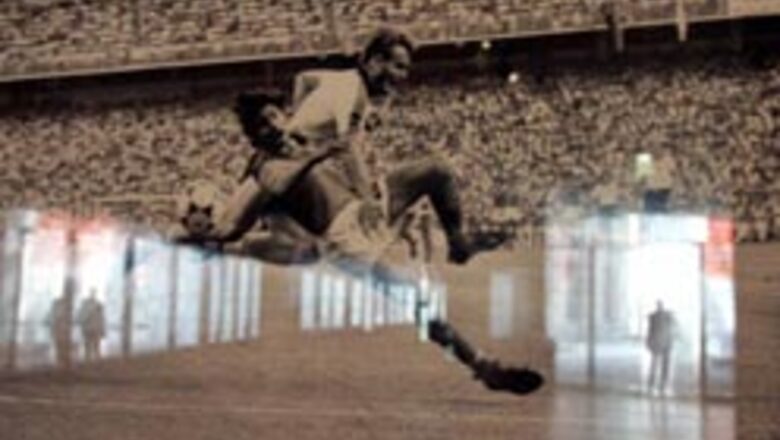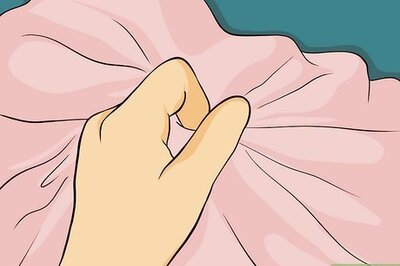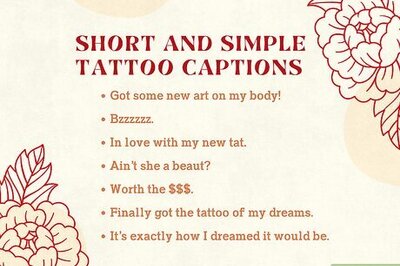
views
Berlin: Soccer players are booed as they give the Nazi salute. Spectators jubilantly unveil a red and white banner sporting the logo of Poland's "Solidarity" trade union, whose goal was democracy for communist Poland.
These are just two snapshots of World Cup history on display at a Berlin exhibition, and they show how political tensions can cast a shadow over "the beautiful game" despite the insistence of power brokers that politics does not play on the pitch.
The exhibition of work by top photo-journalists will run until the end of July at the German Historical Museum, giving fans of the game a chance to visit between matches during the tournament in Germany from June 9.
The show tracks the history of the 17 World Cups held since the first tournament took place in Uruguay in 1930, mixing memorable soccer moments with pictures that went beyond the action on the field to become defining images of an era.
One black-and-white photo from the 1938 World Cup in France shows the German team with their arms raised in the Nazi salute.
The description says the players were greeted by catcalls. The world was on the brink of war and just months before Germany had annexed Austria in Adolf Hitler's first step towards creating a "Greater Germany".
German coach Sepp Herberger was ordered to put five or six Austrians and five or six Germans on the starting roster.
He was furious about this political interference and dismissed his team as a "Viennese melange with a dollop of Prussian cream".
Hitler's "master race" failed to dominate the pitch, but he may have taken consolation from the fact that the 1938 title went to his fascist ally, Mussolini's Italy.
Four decades later, another dictator was given the soccer boost that Hitler did not get - Argentina's Jorge Rafael Videla.
A photo from 1978 shows the legendary long-haired Argentine striker Mario Kempes jumping for joy after his goal broke the deadlock in extra time with the Netherlands, helping seal Argentina's World Cup victory in the final in Buenos Aires.
PAGE_BREAK
We also see jubilant Argentine fans in the stands, decked out in blue and white, the country's national colours.
But the accompanying description says that while the final was underway on June 25, 1978, women gathered outside the stadium to protest against the human rights abuses of the military dictatorship that had taken power in a coup two years earlier.
Another image shows Argentina's grim-faced coach Cesar Luis Menotti, who refused to shake hands with Videla after winning the cup.
He saw the victory as a first step towards toppling the dictatorship. The exhibition also brings Cold War tensions to life.
One 1974 photo puts a soccer spin on the post-World War Two division of Germany into communist east and democratic west.
The smiling West German captain Franz Beckenbauer shakes hands with Bernd Bransch, captain of the East German team.
West Germany won that World Cup, but during the tournament they lost 1-0 to the team from behind the Iron Curtain, the first and last time the two German teams officially met.
A July 1982 photo shows some 2,000 Polish fans displaying a red and white banner during a match against the Soviet Union.
The banner bears the name "Solidarnosc" ("Solidarity"), the trade union led by Lech Walesa who helped bring about an end to communism and Soviet domination of eastern Europe.
The Poland-Soviet Union match was undecided at 0-0. While political moments provide the exhibition's most dramatic pictures, some images are memorable simply for the soccer, like a 1970 image of smiling Brazilian legend Pele trading jerseys with England's Bobby Moore.
There are images of defeat too, like the shot of West German Uwe Seeler after his team lost in the 1966 finals to England.
A contemporary German radio broadcast described the moment: "Uwe Seeler leaves the pitch with his head hanging. His body language conveys all the bitterness of defeat."


















Comments
0 comment